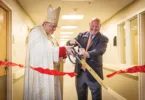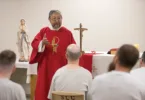
by Marc and Julie Anderson
mjanderson@theleaven.org
TOPEKA — It’s been called predatory lending, and it affects one in 10 Kansas adults.
That equates to 175,000 Kansans annually who use payday loans, a short-term but high-interest loan. Also known as cash advances, they can wreak havoc on people’s finances for years because of the high interest rates they charge.
For example, in Kansas, payday loan companies can legally charge up to 391% interest.
The high interest rate means a simple $500 loan to cover one month’s rent can quickly grow to $1,955 and can keep growing, depending on one’s ability to pay back the loan.
That’s something Christy Grecian and Jim Johnson, both members of Most Pure Heart of Mary Parish in Topeka and of the Kansans for Payday Loan Reform coalition, would like to see changed with the eventual enactment of payday loan reform.
Together with the Kansas Catholic Conference, the coalition has secured two informational hearings to be held on Feb. 17 at the Kansas Capitol and is inviting the public to attend the hearings.
Established in 2019, the coalition consists of two dozen members and is a grassroots movement supporting bipartisan legislation to protect Kansans from predatory lending practices.
Coalition members include, among others, Catholic Charities of Northeast Kansas, the Episcopal Diocese of Kansas and the Missionary State Baptist Convention of Kansas.
Grecian clarified the coalition’s goals.
“The two goals of the coalition are ultimately to give people months, not weeks, to pay back the loan, which is typical of pretty much any debt you take on, and to limit the payments to roughly five or six percent of an individual’s income.”
Although the coalition would like to see traction on reform efforts during this legislative session or even next year’s, it’s thrilled to have secured the informational hearing.
“Legislators can actually get information about what’s going on,” said Chuck Weber, executive director of the Kansas Catholic Conference.
“An informational hearing is just what it sounds like. It’s information only,” he said. “We can bring up all the issues we feel are important — how payday loans are predatory and unfair and hard on working-class Kansans — but there’s not an actual bill that someone can ask about and debate and amend. It’s simply an informational setting where we bring in experts.”
The hearing will feature experts like Gabriel Kravitz, a senior associate with the Pew Research Center’s Consumer Finance project, who provides research and analysis on payday loans to policymakers, regulators and other state stakeholders. The hearing will also feature someone from the office of the bank commissioner to lay out the state landscape as far as current state policies, regulations and statutes. Weber also expects industry members to offer perspective.
“Ultimately, we support payday loan reform. What we are trying to do is to use our expertise in the legislative process to get this moving,” said Weber.
This is an area, Weber said, for which the Catholic Church had been advocating for reform for many years.
The demand for payday loans, say members of the coalition, is high.
“Payday loans for a number of reasons are highly profitable for the owners of them, and the number of options for their clientele is very limited,” explained Weber. “Basically, it comes down to a payday loan in their neighborhood or a loan shark standing on the street. It’s a very tough spot where people are trying to work, trying to pay their bills, trying to pay their rent.
“Sometimes, they don’t have an uncle or aunt or a family member they can borrow from. And so, this is their one and only resort. It puts them in a very difficult spot, and it’s highly profitable for the payday loan industry.”
Grecian said customers often secure payday loans in times of trouble, but end up in worse financial shape.
From a Christian perspective, all three coalition members said it was an unacceptable practice that must be stopped.
“I want to add to this part of the conversation, too, that this area of social justice and payday loan reform is a priority issue with the current pope,” said Johnson. “He’s very aware of this, and he’s identified it as a priority.
“When it gets to a point where it’s normalized within the institutions and within our government,” said Johnson, “that’s a problem, and he’s identified that.
“We’re called to live that Gospel out, and we’re aware we have a responsibility.”
Grecian said she’d love to see more people get behind the coalition’s efforts.
“I think it would be great if people would read this article and come out and support us at the hearing,” she said.
“There’s a lot of division now, all around us,” she continued, “and this has the potential to bring good out of people and really bring people together for the right reason.”






